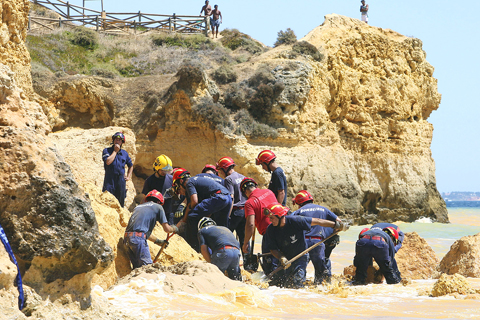At least five people died when a cliff collapsed onto a packed beach in southern Portugal, officials said on Friday, as rescuers using pickaxes and mechanical diggers searched the rubble for victims.
The five dead included a 60-year-old man who suffered a cardiac arrest, a woman, 38, who died of her injuries in hospital, and three other women, two under 25 and one in her fifties, said the Portuguese emergency services.
The nationalities of the victims were not yet known.

PHOTO: AFP
“The Civil Protection authority is continuing to remove victims,” the statement said.
Another three people who had been caught by the falling rubble were hospitalized with serious injuries, the statement said.
Police officers and firefighters were still searching for people who might be trapped under the debris at Albufeira, an Algarve resort popular with local and foreign tourists as well as celebrities.
The authorities, however, could not give a figure for the number that might be missing and the search was hampered by the afternoon high tide, which left most of the beach underwater.
People on the beach described the panic after a massive crash and huge clouds of dust engulfed holidaymakers, said a report by the Portuguese Lusa news agency.
“Part of the cliff came down around noon,” one witness told the agency. “Rocks crashed onto the beach up to the sea causing great panic.”
Another witness, who gave his name as Joaquim Ribeiro, said he saw a “a huge wave of dust, followed by a deafening noise.”
“It was like a plane crashing, people started screaming,” he said.
Police cordoned off the beach, several kilometers from the town center. TV channels showed mechanical diggers and bulldozers clearing sand and rocks from the beach.
A medical station treated people with minor injuries and a psychological support team was also on hand, the Civil Protection authority said.
Portuguese President Anibal Cavaco Silva, on holiday in the area, visited the beach for a first-hand assessment of the situation.
Portuguese Prime Minister Jose Socrates cleared his desk to travel to the scene and Portuguese Interior Minister Rui Pereira was also due to join them.

In the sweltering streets of Jakarta, buskers carry towering, hollow puppets and pass around a bucket for donations. Now, they fear becoming outlaws. City authorities said they would crack down on use of the sacred ondel-ondel puppets, which can stand as tall as a truck, and they are drafting legislation to remove what they view as a street nuisance. Performances featuring the puppets — originally used by Jakarta’s Betawi people to ward off evil spirits — would be allowed only at set events. The ban could leave many ondel-ondel buskers in Jakarta jobless. “I am confused and anxious. I fear getting raided or even

Kemal Ozdemir looked up at the bare peaks of Mount Cilo in Turkey’s Kurdish majority southeast. “There were glaciers 10 years ago,” he recalled under a cloudless sky. A mountain guide for 15 years, Ozdemir then turned toward the torrent carrying dozens of blocks of ice below a slope covered with grass and rocks — a sign of glacier loss being exacerbated by global warming. “You can see that there are quite a few pieces of glacier in the water right now ... the reason why the waterfalls flow lushly actually shows us how fast the ice is melting,” he said.

RISING RACISM: A Japanese group called on China to assure safety in the country, while the Chinese embassy in Tokyo urged action against a ‘surge in xenophobia’ A Japanese woman living in China was attacked and injured by a man in a subway station in Suzhou, China, Japanese media said, hours after two Chinese men were seriously injured in violence in Tokyo. The attacks on Thursday raised concern about xenophobic sentiment in China and Japan that have been blamed for assaults in both countries. It was the third attack involving Japanese living in China since last year. In the two previous cases in China, Chinese authorities have insisted they were isolated incidents. Japanese broadcaster NHK did not identify the woman injured in Suzhou by name, but, citing the Japanese

RESTRUCTURE: Myanmar’s military has ended emergency rule and announced plans for elections in December, but critics said the move aims to entrench junta control Myanmar’s military government announced on Thursday that it was ending the state of emergency declared after it seized power in 2021 and would restructure administrative bodies to prepare for the new election at the end of the year. However, the polls planned for an unspecified date in December face serious obstacles, including a civil war raging over most of the country and pledges by opponents of the military rule to derail the election because they believe it can be neither free nor fair. Under the restructuring, Myanmar’s junta chief Min Aung Hlaing is giving up two posts, but would stay at the